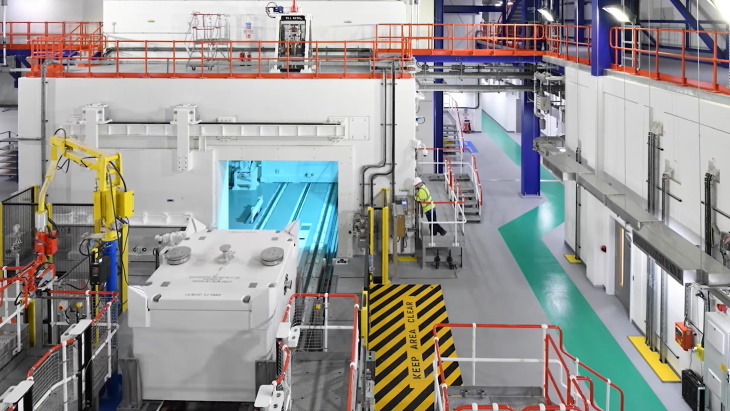
The Box Encapsulation Plant Product Store is a purpose-built, above-ground vault that can store intermediate-level wastes safely and securely for the next 100 years. The store has the capacity to store 6681 waste boxes inside its metre-thick walls, and can receive up to 9 boxes every 24 hours.
The Direct Import Facility is an annex to the store, built to receive the packages of waste retrieved from ageing stores in the oldest parts of the Sellafield site.
This facility received its first box of waste this week after years of planning and testing by hundreds of people, Sellafield Ltd announced.
Its first package contains waste from the Pile Fuel Cladding Silo (PFCS), the oldest waste store at Sellafield, which has stored more than 3200 cubic metres of intermediate-level waste undisturbed for 70 years.
Built between 1950 and 1951, the PFCS is 21 metres high, subdivided internally into six individual compartments. It contains irradiated cladding materials removed from fuel assemblies used in some of the UK's earliest reactors at Windscale and Chapelcross. The PFCS was originally designed to remain sealed forever, but equipment has now been installed to enable the safe removal of the wastes so the facility can be decommissioned.
"Today it represents one of the highest hazards on the Sellafield site, making the removal and repackaging of wastes from the silo a key priority for Sellafield Ltd and the Nuclear Decommissioning Authority," Sellafield Ltd said.
The first batch of waste was successfully retrieved from the silo in August this year. Giant shield doors were installed on the top of the silo to maintain a radiation barrier as holes were cut in the sides of the building to allow access to its contents. The retrievals team then used a remotely-operated crane to reach into the silo, lift out the waste and place it into a specially designed 3-cubic-metre stainless-steel box. Once filled, the five-tonne box was loaded into a shielded transport flask, monitored, and cleared for export to the BEPPS-DIF.
The flask was transported from the silo by road and lifted into the new store by crane. Once inside, the flask had its lid bolts removed and was placed behind a shield door so operators could remotely remove the flask lid, lift out the box, and transfer it to its predetermined location in the store, where it will be held until it is ready for permanent disposal underground in a Geological Disposal Facility.
"The receipt of the first box of waste into the Box Encapsulation Plant Product Store - Direct Import Facility marks an important breakthrough in the clean-up of our site and a huge step forward in our mission to create a clean and safe environment for future generations," said Sellafield Ltd CEO Euan Hutton.
"This is a significant achievement which will enable us to continue to deliver our vital mission and I’d like to extend my thanks to everyone who has been involved for their commitment to the project," added Nuclear Decommissioning Authority group CEO David Peattie. "Removing waste from the Pile Fuel Cladding Silo is one of our biggest challenges, this new facility is providing the storage capability to allow us to do that safely and securely. It also provides future capability for retrievals from other high hazard facilities such as the Magnox Swarf Storage Silo."